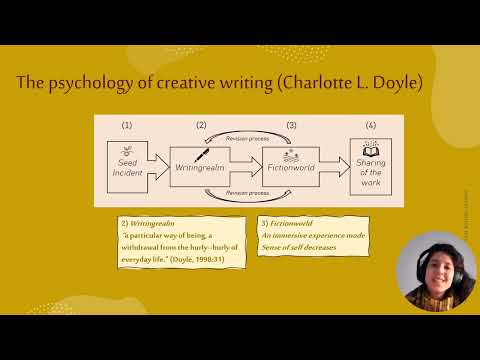 Speaker: Marina de Seta @marina.deseta
Speaker: Marina de Seta @marina.deseta
 Affiliation: Université du Québec à Rimouski
Affiliation: Université du Québec à Rimouski
Title: Writing to Empathize: How Creative Writing Can Boost Empathy
Abstract (long version below): This symposium explores the transformative potential of creative writing in fostering empathy, self-understanding, and social cognition. Diverse approaches will be presented, including: phenomenological perspectives on intersubjectivity and empathy; the emotional and psychological benefits of poetic autoethnography; and comparisons between the effects of literary reading and creative writing on empathy. The presentations investigate how literary writing practices can promote personal growth, deepen emotional clarity, and enable individuals to vividly simulate others’ perspectives. Together, these presentations aim to highlight creative writing’s power in bridging individual experiences, enhancing emotional insight, and fostering greater interpersonal understanding and connection.

 Long abstract
Long abstract
There is a common belief that literary authors possess exceptional human insight, particularly a deeper understanding of the human psyche, enabling them to create high-quality fiction. This perception suggests their work embodies a wisdom that surpasses other writers or groups. While empathy may enhance writing skill, not all writers demonstrate equally strong empathic abilities. In this presentation, we explore an alternative causal relationship: that the activity of creative writing could enhance empathy.
Existing research highlights the link between reading fiction and empathy (Bal/Veltkamp, 2013; Black et al. 2021; Djikic et al. 2013; Eekhof, 2024; Koopman, 2016; Koopman/Hakemulder 2015; Scapin et al., 2023;), showing how engaging with narratives can evoke empathic responses. However, studies on how creative writing fosters empathy—particularly its neural and psychological mechanisms—remain scarce. Insights from fields like narrative medicine (Charon, 2017; Chen/Forbes 2014) suggest reflective and point-of-view writing may enhance empathic traits, but these approaches often conflate writing’s effects with group discussions or pre-existing empathic tendencies, complicating causal claims.
Emerging evidence, such as studies by Kou et al. (2020), shows correlations between writing fiction and prosocial traits like empathic concern and perspective-taking, but the data are ambiguous regarding the relative significance of reading versus writing for empathy. Drawing inspiration from Charlotte L. Doyle’s article on the psychology of writing (1998) and the writing experiences described by authors themselves in The Paris Review interviews, we explore theoretical and practical ways in which creative writing might foster empathy more effectively than reading, emphasizing imaginative engagement and character embodiment during the writing process. Finally, by drawing parallels with fiction reading research, we propose hypotheses for designing writing tasks to enhance empathy, inviting the empirical testing of these ideas to clarify the relationship between writing and empathy.
References
Bal, P. M., & Veltkamp, M. (2013). How Does Fiction Reading Influence Empathy? An Experimental Investigation on the Role of Emotional Transportation. PloS one, 8(1), e55341.
Black, J. E. et al. (2021). Stories and Their Role in Social Cognition, Handbook of empirical literary studies (Kuiken D, Jacobs AM, eds), 229–250.
Charon, R. (2017). The principles and practice of narrative medicine. Oxford University Press.
Chen, I., Forbes, C. (2014). Reflective Writing and Its Impact on Empathy in Medical Education: Systematic Review. Journal of educational evaluation for health professions, 11.
Djikic, M., Oatley, K., et Moldoveanu, M. C. (2013). Reading Other Minds: Effects of Literature on Empathy, Scientific study of literature, 3(1), 28–47.
Dodell–Feder, D., Tamir, D. I. (2018). Fiction Reading Has a Small Positive Impact on Social Cognition: A Meta–Analysis, Journal of Experimental Psychology: General, 147(11), 1713.
Doyle, C. L. (1998). The Writer Tells: The Creative Process in The Writing of Literary Fiction, Creativity Research Journal, 11(1), 29–37.
Eekhof, L. S. (2024). Reading the mind: The relationship between social cognition and narrative processing. (Doctoral dissertation, Radboud University Nijmegen Nijmegen).
Koopman, E. M. E. (2016). “Effects of “literariness” on emotions and on empathy and reflection after reading”. Psychology of Aesthetics, Creativity, and the Arts, 10(1), 82.
Koopman, E. M., Hakemulder, F. (2015). Effects of literature on empathy and self–reflection: A theoretical–empirical framework. Journal of Literary Theory, 9(1), 79–111.
Kou, X., Konrath, S., Goldstein, T. R. (2020). “The relationship among different types of arts engagement, empathy, and prosocial behavior”. Psychology of Aesthetics, Creativity, and the Arts, 14(4), 481.
Scapin, G., et al. (2023). “The role of processing foregrounding in empathic reactions in literary reading”, Discourse Processes, 60:4–5, 273–293

